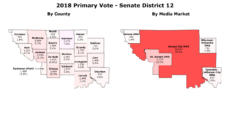Hiking taxes unnecessarily harms consumers. Yet too many municipalities in Missouri have been trying to impose taxes on popular and widely used online video platforms like Netflix and Hulu. That’s why I have sponsored House Bill 2057, to prohibit cities from taxing these and other streaming services. A “Netflix tax” would raise costs for Missouri families, limit consumer choice, and hinder economic growth.
Franchise fees are a way for cities to recoup costs from traditional video providers, like cable and phone companies, from digging up streets, laying or hanging wires, and accessing rights of way. It makes no sense to impose franchise fees on streaming. These services are accessed over the internet. Therefore, there is no impact on cities’ infrastructure.
Fortunately, courts have already ruled against Missouri cities from taxing streaming through cable franchise fees; this bill will clarify state law to prevent frivolous lawsuits that waste taxpayer dollars and discourage investment.
There are many other reasons why taxing streaming is bad for the Show Me State:
First, such taxes could discourage innovation and competition within the entertainment industry. Platforms like Netflix have revolutionized how content is produced, distributed, and consumed. But producing high-quality content is expensive. Taxing streaming services would not only siphon funds that could otherwise be used to invest in original content, it would also discourage small and independent creators from launching their own streaming services. This could ultimately lead to a decline in the quality and variety of entertainment available to consumers.
Second, such taxes may disproportionately impact low-income individuals who rely on streaming services as an affordable alternative to traditional cable or satellite TV. Implementing additional taxes could make these services less accessible to those who can least afford it, further contributing to economic disparities in society. In the era of Biden-flation, a direct tax increase on Missouri families should never be the answer.
Third, taxing streaming services could lead to a reduction in consumer choice. Consumers may be forced to cut down on subscriptions. This could limit the diversity of content available to viewers, undermining the very essence of the streaming model, which thrives on providing a wide range of options to cater to diverse tastes. These taxes wouldn’t just be imposed on large platforms like Netflix, but also smaller providers, including those that offer educational content. The burden of complying with the tax regime would fall hardest on those companies with the least resources. They may simply decide to exit Missouri rather than pay for the lawyers, programmers, and accountants needed to implement the tax.
As a former Chesterfield councilman, I’m familiar with local government’s bottomless appetite for more revenue. Of course cities want to increase revenue, but raising prices for Missourians is the wrong approach, with far-reaching negative consequences. Instead of imposing taxes that hinder innovation and limit choices, municipalities should focus on making themselves a hospitable place to do business. Pro-business policies will bring in revenue without the need to reach further into our residents’ wallets.
I am proud that my bill has already drawn support from a range of taxpayer advocates, including Americans for Tax Reform President Grover Norquist, Citizens Against Government Waste, National Taxpayers Union, and Taxpayers Protection Alliance. I will fight to pass this bill to protect Missouri consumers from harmful taxes.

Rep. Ben Keathley (R-Chesterfield) represents Missouri’s 101st District and is a former member of the Chesterfield City Council







